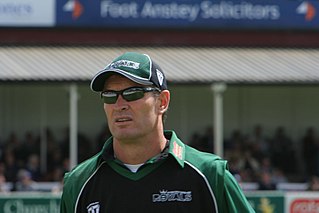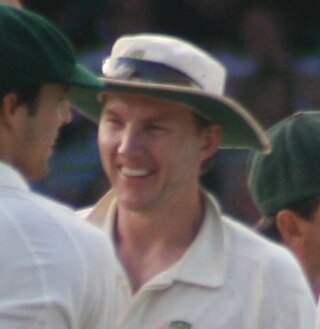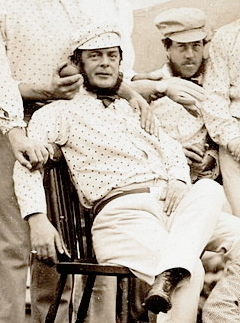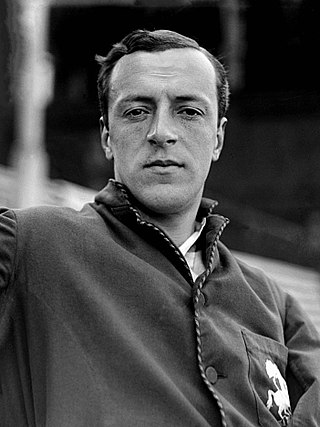Related Research Articles

Graeme Ashley Hick is a Zimbabwean-born former England cricketer who played 65 Test matches and 120 One Day Internationals for England. He was born in Rhodesia, and as a young man played international cricket for Zimbabwe. He played English county cricket for Worcestershire for his entire English domestic career, a period of well over twenty years, and in 2008 surpassed Graham Gooch's record for the most matches in all forms of the game combined. He was a part of the English squad which finished as runners-up at the 1992 Cricket World Cup.

Brett Lee is an Australian former international cricketer, who played all three formats of the game. During his international career, Lee was recognised as one of the fastest bowlers in the world. With his time representing Australia, Lee won multiple ICC titles with the team: the 2003 Cricket World Cup, the 2006 ICC Champions Trophy, and the 2009 ICC Champions Trophy. Lee was the first bowler to take a hat-trick in the T20 format of the game which he did in 2007 ICC World Twenty20 in the inaugural tournament against Bangladesh, subsequently being the first bowler to do so at an ICC Men's T20 World Cup. Lee was also the first Australian bowler to take a hat-trick at a Cricket World Cup which he did in the 2003 Cricket World Cup Super Match game against Kenya.

Worcestershire County Cricket Club is one of eighteen first-class county clubs within the domestic cricket structure of England and Wales. It represents the historic county of Worcestershire. Its Vitality Blast T20 team has been rebranded the Worcestershire Rapids, but the county is known by most fans as 'the Pears'. The club is based at New Road, Worcester. Founded in 1865, Worcestershire held minor status at first and was a prominent member of the early Minor Counties Championship in the 1890s, winning the competition three times. In 1899, the club joined the County Championship and the team was elevated to first-class status. Since then, Worcestershire have played in every top-level domestic cricket competition in England.
Oxford UCCE started their 2005 first-class season with a weak draw against a Gloucestershire side that opted to use the game as batting practice. Their second first-class game, against Derbyshire, Oxford UCCE did well in the first innings, dismissing their visitors cheaply and building up a large lead. However, they weren't able to dismiss them a second time, in a game which was reduced through rain. In the third match, they lost by ten wickets against Lancashire, after a poor showing in their second innings.
Cambridge UCCE had a good start to their 2005 first-class season, setting Essex a target of 270 to win, after declaring in their second innings on 255 for 4. They took 6 wickets in defending the total, although they lost to the county in the end. They then narrowly lost to Warwickshire before beating Yorkshire in their last game of the season against a first-class county. They also played two matches as Cambridge University against Oxford University, winning the one-day game, but falling by an innings and 213 runs in their final first-class game of the season.

Samuel Moses James Woods was an Australian sportsman who represented both Australia and England at Test cricket, and appeared thirteen times for England at rugby union, including five times as captain. He also played at county level in England at both soccer and hockey. At cricket—his primary sport—he played over four hundred first-class matches in a twenty-four-year career. The majority of these matches were for his county side, Somerset, whom he captained from 1894 to 1906. A. A. Thomson described him thus: "Sammy ... radiated such elemental force in hard hitting, fast bowling and electrical fielding that he might have been the forerunner of Sir Learie Constantine."
Norman Gifford is a retired English cricketer, who played primarily as a left-arm spinner. Gifford played county cricket for Worcestershire, and Warwickshire County Cricket Clubs, and represented England in fifteen Test matches and two One Day International between 1964 and 1985.

John Wisden was an English cricketer who played 187 first-class cricket matches for three English county cricket teams, Kent, Middlesex and Sussex. He is now best known for launching the eponymous Wisden Cricketers' Almanack in 1864, the year after he retired from first-class cricket.

Thomas Walter Hayward was an English first-class cricketer who played for Surrey and England between the 1890s and the outbreak of World War I. He was primarily an opening batsman, noted especially for the quality of his off-drive. Neville Cardus wrote that he "was amongst the most precisely technical and most prolific batsmen of any time in the annals of cricket." He was only the second batsman to reach the landmark of 100 first-class centuries, following WG Grace. In the 1906 English season he scored 3,518 runs, a record aggregate since surpassed only by Denis Compton and Bill Edrich in 1947.
Alan Mullally is an English former first-class cricketer, who played Tests and ODIs. Mullally grew up in Western Australia, and played for the Australian Under-19 side against their West Indian counterparts in 1987/88.
Benjamin Francis Smith is a former English first-class cricketer who was a right-handed batsman and occasional right-arm medium-pace bowler.
Alan Christopher Smith, often known as A. C. Smith, is an English former Test cricketer, who appeared in six Tests matches for England. Primarily a wicket-keeper, Smith was also a capable right-handed middle-order batsman and right-arm seam bowler. Very unusually for a regular wicket-keeper, he was sometimes selected by Warwickshire as a frontline bowler.
Christopher George Liptrot, sometimes known as Chris Liptrot, is an English former cricketer who played for Worcestershire. He was born in Wigan, Greater Manchester. His short career was plagued by a persistent back problem which eventually forced his premature retirement.
Duncan Neil Catterall is an English cricketer who played first-class cricket for Worcestershire and currently plays at minor counties level for Shropshire. He was born in Preston, Lancashire.

The Australian cricket team toured England during the 1902 English cricket season. The five-Test series between the two countries has been fondly remembered; in 1967 the cricket writer A. A. Thomson described the series as "a rubber more exciting than any in history except the Australia v West Indies series in 1960–61". Australia had won the previous three Test rubbers between the two countries, and now won their fourth successive series, by two matches to one with two draws. In the process they "beat the records of all their predecessors in the country" by losing only two of 39 matches during the tour, their defeats being against England in the Fifth Test and in the first of their two fixtures against Yorkshire. The remaining 37 matches gave 23 wins for Australia and 14 draws.
The New Zealand cricket team toured England in the 1937 season. The team was the third from New Zealand to tour England, following those of 1927 and 1931, and the second to play Test matches. Three Tests were arranged: England won the second match at Manchester, and the games at Lord's and The Oval were drawn, the latter affected by rain. On the tour as a whole, the New Zealanders played 32 first-class matches, winning nine and losing nine, with 14 ending as draws.
George Herbert Chesterton MBE was an English cricketer who played first-class cricket between 1949 and 1966. The bulk of his appearances were for Worcestershire, whom he represented between 1950 and 1957. He was capped by the county in 1950. Very much a specialist bowler, he never reached 50 in over 100 first-class innings.
Robert George Mallaby Carter, is a former English cricketer who played first-class and List A cricket for Worcestershire. He was capped by the county in 1965, and was awarded a benefit season in 1973, which raised about £7,000. All but two of his 523 first-class wickets came for Worcestershire; the others were obtained for Marylebone Cricket Club (MCC) in the very last game of his career. Carter's batting was generally extremely poor, as evidenced by his career batting average of under five in both forms of the game, although he did play one significant – if ultimately fruitless – innings. In the 1963 Gillette Cup final against Sussex at Lord's, he came to the wicket with Worcestershire 133/9, needing 35 runs to win. In fading light, he and wicket-keeper Roy Booth added 21 before Carter was run out to end the match. Carter also played in a critical close finish the following season against Nottinghamshire, where he and Flavell managed to get home by a single wicket and virtually seal the county's first Championship title.

Bernard James Tindal Bosanquet was an English cricketer best known for inventing the googly, a delivery designed to deceive the batsman. When bowled, it appears to be a leg break, but after pitching the ball turns in the opposite direction to that which is expected, behaving as an off break instead. Bosanquet, who played first-class cricket for Middlesex between 1898 and 1919, appeared in seven Test matches for England as an all-rounder. He was chosen as a Wisden Cricketer of the Year in 1905.

Reginald Henshall Brindley Bettington was an Australian first-class cricketer and medical specialist.
References
- ↑ "Tom Hicks". CricketArchive. Retrieved 9 March 2013.